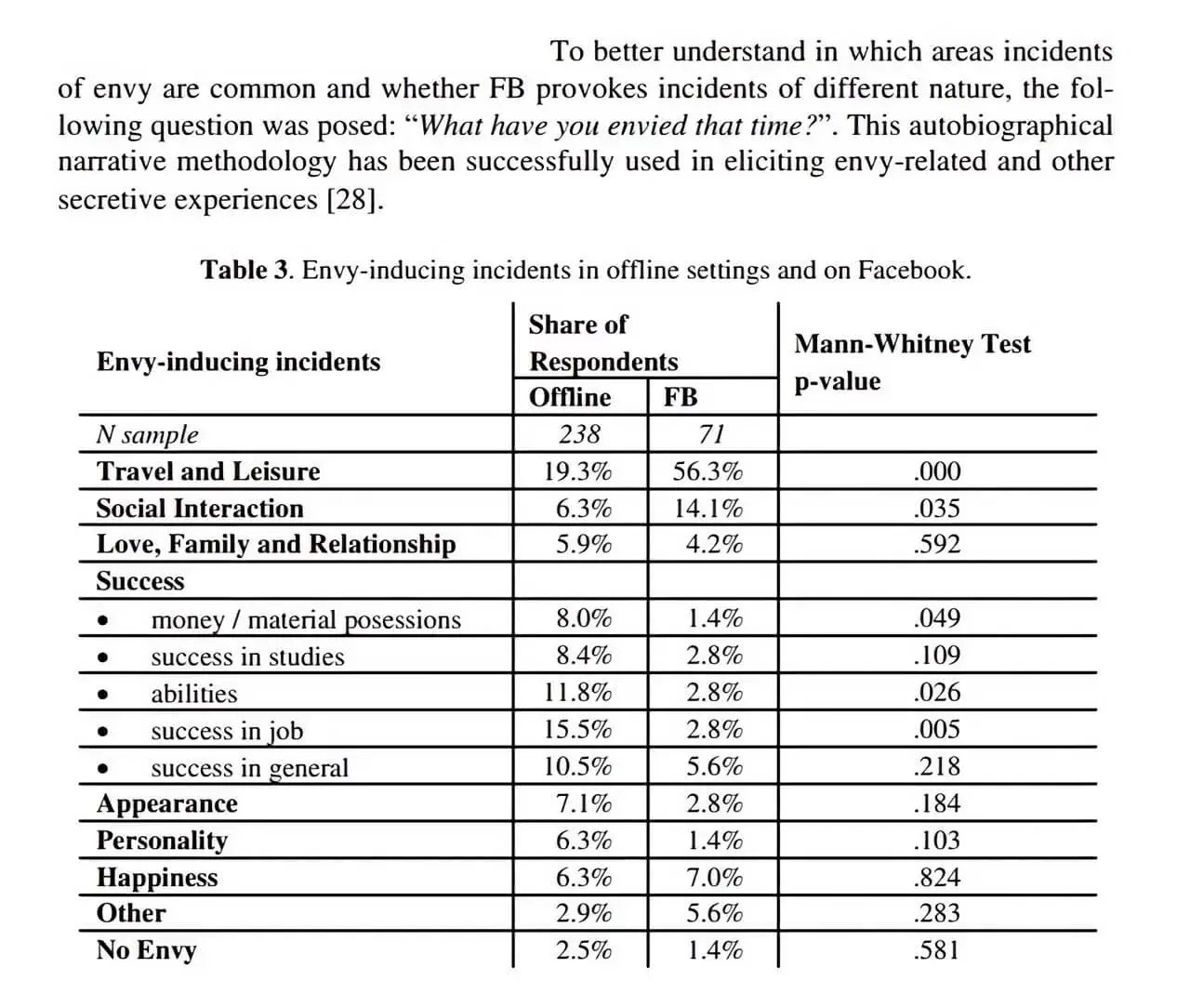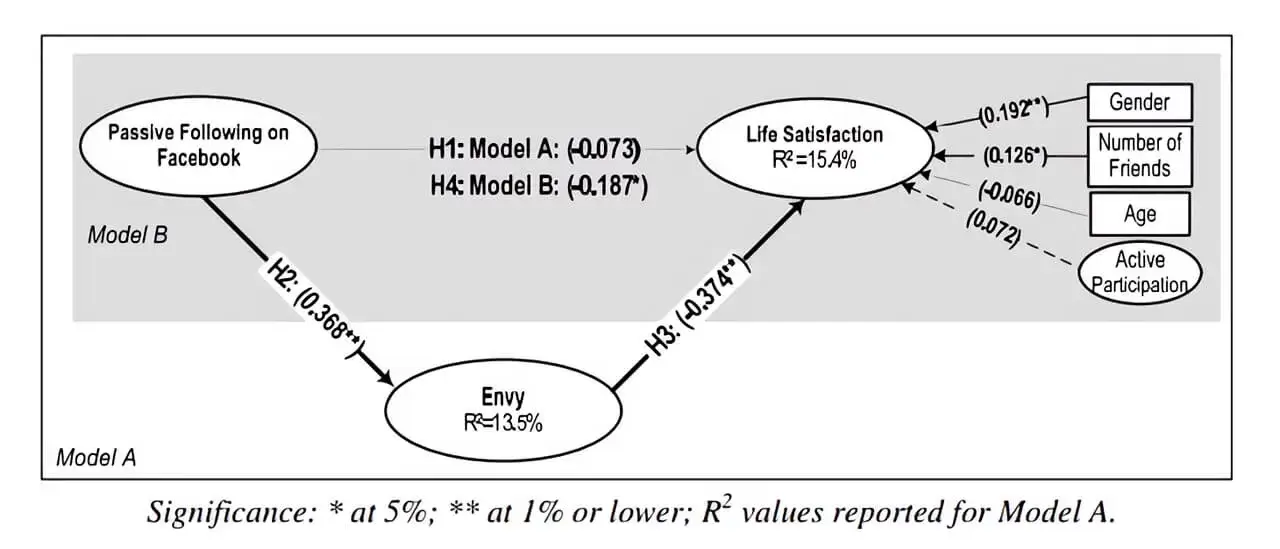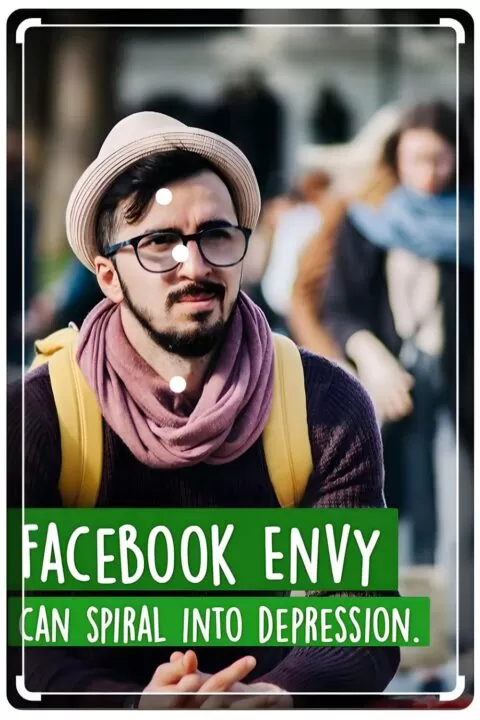Today's Monday • 8 mins read
— By Dr. Sandip Roy.
You’ve probably felt this: Facebook use leads to envy.
Your friends post vacation photos. Someone announces a new job. Another friend shares pictures of a fantastic achievement. Scrolling through all that makes you feel bad about your own life.
Two facts from research:
- 30% of Facebook users feel worse about their lives after scrolling through the app.
- People feel more envy when they use Facebook to get information, seek attention, or kill time.
Strange thing, your social media friends make you envious, even when they don’t mean to.
Envy is a negative emotional response to another person’s superior quality, achievement, or possession. The envier:
- either desires to have what the other person has,
- or wishes that the person they envy lacks the same.
How do you get over it?
What Is Facebook Envy?
Facebook envy = intense discontent or resentment that comes from thinking your social media friends are having more exciting and fulfilling lives than you.
Facebook envy happens when you feel unhappy about not having what your online friends have. You wish to have their life experiences, successes, and good fortune.
Facebook envy comes from comparing your real life to their curated online posts. You think they live interesting lives while you are living a normal, dull life.
So, their accomplishments trigger shame. Their travels make you feel stuck. Their activities make your life seem empty.

10 Facebook Envy Facts From Research
- Vacation images were the most common cause of envy on Facebook. Holiday shots sparked 56.3% of the envy incidents on Facebook (Krasnova & Wenninger, 2013).
- Envy on Facebook leads to an “envy spiral.” Those who feel envy tend to “dress up” their timelines with pictures and statuses that will further make others envious. (Talk of revenge envy!)
- Passive surfers (those who “endlessly scroll”) on Facebook felt the greatest dissatisfaction. A study confirmed that passive use of Facebook leads to people feeling less and less good over time. The main reason was that more passive scrolling made people more envious of others (Kross & Verduyn, 2013).
- Increased Facebook use leads to higher levels of depression, and creates a self-sustaining cycle of more depression causing more Facebook use. This relationship becomes stronger when we consider the role of envy. More Facebook use can lead to greater feelings of envy, which then leads to more depression (Tandoc & Goh, 2021).
- One-third of people felt worse, more frustrated with their lives, and envious after going to Facebook (Krasnova & Wenninger, 2013).
- A comparison of social interactions was the second most typical reason for envy. FB users compared how many birthday greetings they received against those of their Facebook friends. They also counted how many Likes or remarks they gathered on their images and posts.
- The “happiness of others” was the third most frequent cause of envy. Men, specifically those in their mid-30s, were more than likely to envy the happiness of others. This was because the men tended to post more self-promotional stuff on Facebook — to let people know of their achievements and portray themselves in a better light.
- Women were more prone to envy the physical attractiveness — looks and beauty — of their FB friends. The reason could be that women tend to post more content on their walls that emphasize good looks and happier social lives. So, “happy/pretty” seems to be an obvious reference point for women.
- Kross and Verduyn found that the more people used Facebook at a certain time, the worse they felt the next time. And the more they used Facebook over a given period, the more their life satisfaction levels fell during that period.
- Facebook use can trigger envy and negatively impact mental health, more so when people compare themselves to other people’s positive posts. These comparisons can decrease overall happiness and increase feelings of depression, particularly when the posts are from close friends (Pera, 2018).
How To Overcome Facebook Envy And Find Joy
Here are 5 ways to overcome Facebook envy:
1. Realize other people also have problems (that they don’t post).
Envy comes from upward comparisons. You compare yourself to people who seem better off.
People on Facebook mostly show their best moments. Not their struggles or setbacks.
If you were to get a closer look at their lives, you might see their lives have frustrations too, almost as many as yours.
- Their perfect vacation photo? They might have fought with their family that day.
- Their dream job announcement? They could be stressed about the workload.
You see their highlight reel. And compare it to your everyday moments.
- Your friend posts a promotion. You don’t see the sleepless nights studying for it. The anxiety before exams. The times they wanted to quit.
- Another friend shares their new car. You don’t see the debt they took on. The extra hours they work to pay for it.

Focus on your own path. Not the edited versions you see online. Because the grass isn’t always greener on the other side.
2. Pass over their holiday pictures discreetly
Mute the vacation posts.
Shots of your friends holidaying in picturesque places on Earth are the biggest cause of Facebook frustration and envy.
Understand clearly that they are on holiday and you are not. Probably, you are watching those pictures from inside your daily routine.
Don’t flip through them. And if possible, don’t even acknowledge them.
- As a general rule, get off Facebook for some time or mute posts that make you envious.
3. Take occasional breaks from Facebook
Unfollow the triggers.
Not every “friend” needs to be in your feed. Go on a social media detox.
Take regular breaks from Facebook altogether. Step away from the constant comparisons and reconnect with the real world.
Spend time with loved ones, pursue hobbies you enjoy, and focus on creating your own joy, not living vicariously through others.
Do not passively follow someone’s Facebook feed.

4. Stop comparing your life with others in general
Celebrate your own wins.
Stop comparing your entire life to someone else’s curated online snippets. Instead, celebrate your own victories, big and small.
Acknowledge your progress, appreciate your unique journey, and find joy in the everyday moments that make your life special.
Comparing your entire life with the sparkling bits of your Facebook friends will always be a self-defeating scenario.
5. Be more appreciative of the good things in your life
Rediscover the small joys in your own life.
As we see the carefully curated highlights of other people’s lives, we tend to overlook the good parts of our own lives. Be thankful for your blessings in life.
Choose to fill your newsfeed with things that inspire you, not those that leave you feeling down.
Remember, social media should be a window to uplift, not a breeding ground for envy.
Social Scientists Expose the Dark Side of Facebook
Facebook is an unparalleled platform for social assessment. Many social scientists go to it because of its reach and range.
- Facebook triggers narcissistic tendencies within us.
- Studies show Facebook fuels narcissistic tendencies in middle-aged adults.
- German scientists found Facebook envy is a hidden threat to life-satisfaction and can lead to loneliness and depression.
Most causes of Facebook envy are triggered by:
- Travel and leisure
- Social interactions
- Happiness
- Success in a job
- Abilities
“Travel and leisure” posts cause 56.3% of all envy incidents on FB.
So, while traveling increases your happiness, posting your holiday pictures on social media can cause others to envy you.

Envy caused the most frustration on Facebook, ahead of loneliness, waste of time, and lack of attention.
The study authors write:
We find that “envy” emerges as the category of the highest importance with 29.6% of respondents mentioning it as a major reason behind frustration and exhaustion of “others”. Feelings of envy by far surpass such causes, as “lack of attention” (19.5%), “loneliness” (10.4%), and “time loss” (13.7%).
Moreover, those who scrolled their feed passively felt worse and more disappointed with their lives. They wrote:
According to our findings, passive following triggers invidious emotions, with users mainly envying happiness of others, the way others spend their vacations, and socialize. … In fact, feelings of envy mediate the relationship between passive consumption of information on Social Networking Sites and life satisfaction.
Passive following means surfing Facebook without making any updates or interacting with others.

Further Reading
- Facebook use, envy, and depression among college students: Is Facebooking depressing? — Tandoc & Ferrucci (2015).
- Seeing Everyone Else’s Highlight Reels: How Facebook Usage is Linked to Depressive Symptoms — Steers & Wickham (2014).
- Social Media Use Associated With Depression Among U.S. Young Adults — Lin et al.,(2016).
Final Words
One sentence strategy to handle social envy: Envy-prone users should use social networks for specific purposes and avoid passive pursuits. (Wallace & James, 2017).
Researchers from the Tilburg Institute for Behavioral Economics describe two types of envy:
- Benign envy. Usually good, makes you want to learn more, do better, and stay motivated.
- Malicious envy. Mostly destructive, dragging you down, and taking away your happiness.
Let Facebook give you the benign kind of envy, and here are two ways to do that:
- Compare your life with only those who are just marginally better than you.
- Remind yourself that social media is often a curated highlight reel, not reality.
√ Also Read: How much do your Facebook friends reduce your happiness?
√ Please spread the word if you found this helpful.
